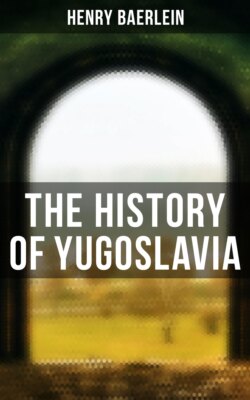Читать книгу The History of Yugoslavia - Henry Baerlein - Страница 78
На сайте Литреса книга снята с продажи.
THE TURK IN MONTENEGRO AND MACEDONIA
ОглавлениеThe Emperor of a great many Southern Slavs, the Sultan, had in his time been satisfied if he could squeeze out of the Montenegrins so much tribute as would every year pay for his slippers. He could send an army now and then to devastate Cetinje and destroy the monastery where the people's bishop lived, but in those mountains a large army ran the risk of being ambushed and a very large one would be starved. Besides, now that the European scientists and travellers were beginning to go up to Montenegro and were, among the few sights of Cetinje, always shown the shrivelled head of Kara Mahmud Pasha, who in 1796 had been defeated, it was not advisable, the Sultan thought, that any other Turkish head of prominence should have this fate. … In Macedonia it was very different; the population might have once been warlike, but had so successfully been governed that some German travellers of the sixteenth century, Hans Ternschwamm and Ritter Gerlach, had described them as a "conquered, down-trodden, imprisoned people" who did not dare to lift up their heads, a people who "without intermission must toil for the Turks." And if three hundred years of this life had not completely tamed them, the Sultan had every confidence that the Greek Patriarch would tell the Powers what they knew already, namely, that the Macedonian Christians only had to pay a tenth and sometimes only an eleventh part of certain crops and that in return they were protected by the Spahi from the ills which every humbler man is heir to, and that the Powers, who politically said they must respect the Sultan, must now morally respect him also. But in 1850 the Turkish Government made a change; in place of the old Spahi there was installed a landlord who retained the name of Spahi but who had none of his predecessor's careless benevolence. The property had been hired out to him for life and his one object was to get from it as much as possible. He made demands not only for a tenth but for a fifth and even a third part, and not only of the maize and wheat but of every product of the soil. Cattle, bees, vegetables, fruit—of all of these he had to have his share; the peasant often cut his fruit trees down as he could not afford to pay the various taxes that were put on them. In the old days the Spahi had an arrangement with a whole village, and a system so impersonal was much less onerous than when demands were made from every household individually. The new sort of Spahi was not only an evil product of the time, but as the progress of industry in other countries was supplying the Turkish market with many new commodities, so in order to acquire these articles for himself he exacted more and more tribute from the helpless peasants. Progress in Macedonia was not merely retarded—lands which had been under cultivation were abandoned, and the peasant, having been despoiled of everything, perhaps having borrowed money at 9 or 10 per cent., was no longer able to get his living from the land on which so many generations of his ancestors had laboured. It was no longer possible for him to get the mess of maize and miserable bread, the strips of repulsive-looking flesh that were his luxury, the medicine for his underfed children who were moaning on the naked earth of his cabin, and at the same time to make the necessary contributions to the landlord or the landlord's agent, whom the villagers had to furnish with a riding horse, with gun and ammunition, with furs and with clothing appropriate to his position, with special gifts whenever he or they were marrying, and with all the pretty girls on whom his eye had rested. Therefore the čifčija would lose the last shadow of freedom, he would become a serf. His sowing and his reaping would now be for another, and as it did not profit him at all to make the land more fruitful, he was content with any prehistoric implement, with little wooden ploughs and with a total absence of manure. And yet this pitiable serf would often be in a position less deplorable than that of one who had a little freedom left and who was called a free man, for the Turk would treat him no worse than the mule whose continual existence he desires. It does not seem surprising if these Christians wanted to be liberated from the Turk and did not greatly mind what uniform their rescuers would wear.
